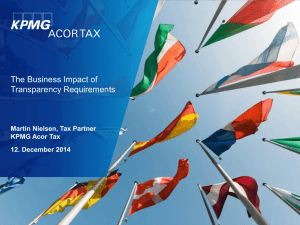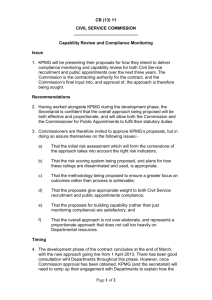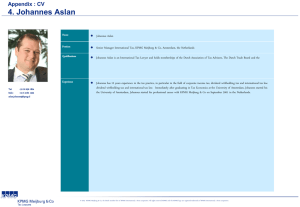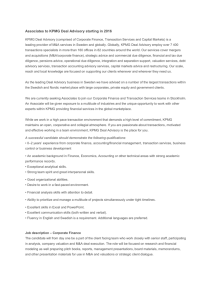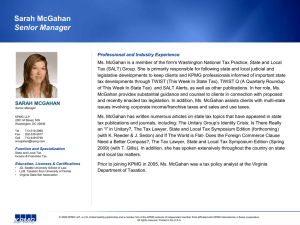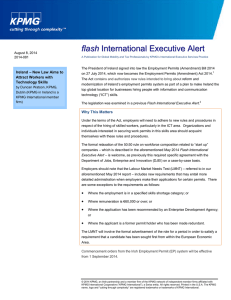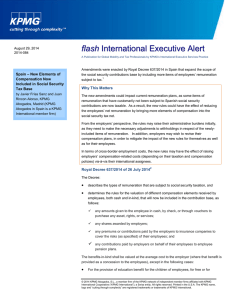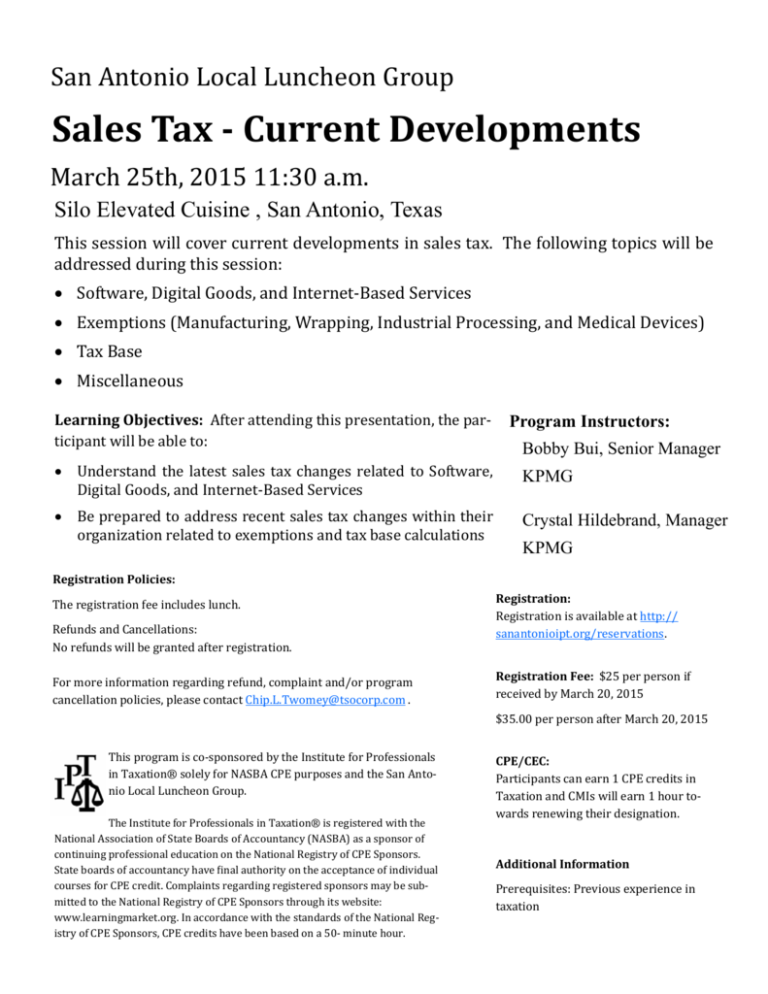
SanAntonioLocalLuncheonGroup
SalesTax‐CurrentDevelopments
March25th,201511:30a.m.
Silo Elevated Cuisine , San Antonio, Texas
Thissessionwillcovercurrentdevelopmentsinsalestax.Thefollowingtopicswillbe
addressedduringthissession:
Software,DigitalGoods,andInternet‐BasedServices
Exemptions(Manufacturing,Wrapping,IndustrialProcessing,andMedicalDevices)
TaxBase
Miscellaneous
LearningObjectives:Afterattendingthispresentation,thepar‐
ticipantwillbeableto:
Program Instructors:
Bobby Bui, Senior Manager
Understand the latest sales tax changes related to Software,
DigitalGoods,andInternet‐BasedServices
KPMG
Bepreparedtoaddressrecentsalestaxchangeswithintheir
organizationrelatedtoexemptionsandtaxbasecalculations
Crystal Hildebrand, Manager
KPMG
RegistrationPolicies:
Theregistrationfeeincludeslunch.
RefundsandCancellations:
Norefundswillbegrantedafterregistration.
Formoreinformationregardingrefund,complaintand/orprogram
cancellationpolicies,pleasecontactChip.L.Twomey@tsocorp.com.
RegistrationFee:$25perpersonif
receivedbyMarch20,2015
$35.00perpersonafterMarch20,2015
Thisprogramisco‐sponsoredbytheInstituteforProfessionals
inTaxation®solelyforNASBACPEpurposesandtheSanAnto‐
nioLocalLuncheonGroup.
TheInstituteforProfessionalsinTaxation®isregisteredwiththe
NationalAssociationofStateBoardsofAccountancy(NASBA)asasponsorof
continuingprofessionaleducationontheNationalRegistryofCPESponsors.
Stateboardsofaccountancyhave inalauthorityontheacceptanceofindividual
coursesforCPEcredit.Complaintsregardingregisteredsponsorsmaybesub‐
mittedtotheNationalRegistryofCPESponsorsthroughitswebsite:
www.learningmarket.org.InaccordancewiththestandardsoftheNationalReg‐
istryofCPESponsors,CPEcreditshavebeenbasedona50‐minutehour.
Registration:
Registrationisavailableathttp://
sanantonioipt.org/reservations.
CPE/CEC:
Participantscanearn1CPEcreditsin
TaxationandCMIswillearn1hourto‐
wardsrenewingtheirdesignation.
AdditionalInformation
Prerequisites:Previousexperiencein
taxation
Current Developments
in Sales and Use
Taxation
IPT San Antonio Luncheon
March 25, 2015
Notice
The following information is not intended to be “written advice concerning one
or more Federal tax matters” subject to the requirements of section 10.37(a)(2)
of Treasury Department Circular 230.
You (and your employees, representatives, or agents) may disclose to any and
all persons, without limitation, the tax treatment or tax structure, or both, of any
transaction described in the associated materials we provide to you, including,
but not limited to, any tax opinions, memoranda, or other tax analyses
contained in those materials.
The information contained herein is of a general nature and based on
authorities that are subject to change. Applicability of the information to
specific situations should be determined through consultation with your tax
adviser.
© 2014 KPMG LLP, a Delaware limited liability partnership and the U.S. member firm of the KPMG network of independent member firms affiliated with KPMG International Cooperative
(“KPMG International”), a Swiss entity. All rights reserved. KPMG and the KPMG logo are registered trademarks of KPMG International Cooperative (“KPMG International”), a Swiss entity.
INTERNAL USE ONLY. Not for distribution to clients unless the technical and policy review requirements of Tax Services Manual section 23.7 are satisfied.
1
Key Areas of Development in Sales and Use Taxes
• Software, Digital Goods, and Internet-Based Services
• Exemptions
• Tax Base
• Miscellaneous
© 2014 KPMG LLP, a Delaware limited liability partnership and the U.S. member firm of the KPMG network of independent member firms affiliated with KPMG International Cooperative
(“KPMG International”), a Swiss entity. All rights reserved. KPMG and the KPMG logo are registered trademarks of KPMG International Cooperative (“KPMG International”), a Swiss entity.
INTERNAL USE ONLY. Not for distribution to clients unless the technical and policy review requirements of Tax Services Manual section 23.7 are satisfied.
2
Software, Digital Goods,
and Internet-Based
Services
3
Software, Digital Goods, and Internet-Based Services
Comcast v. City of Golden (Colo. Dist. Ct. Jul. 1, 2014)
• A municipality (the City of Golden, Colorado) could not require a cable and Internet
service provider to collect and remit local sales tax on its sales of high-speed
broadband Internet access
• Although the taxpayer’s service fell within the definition of a taxable
telecommunications service, the City did not establish that it “generally collected”
sales and use tax on Internet access services prior to October 1, 1998
• Thus, the taxpayer was not grandfathered in under the Internet Tax Freedom Act
© 2014 KPMG LLP, a Delaware limited liability partnership and the U.S. member firm of the KPMG network of independent member firms affiliated with KPMG International Cooperative
(“KPMG International”), a Swiss entity. All rights reserved. KPMG and the KPMG logo are registered trademarks of KPMG International Cooperative (“KPMG International”), a Swiss entity.
INTERNAL USE ONLY. Not for distribution to clients unless the technical and policy review requirements of Tax Services Manual section 23.7 are satisfied.
4
Software, Digital Goods, and Internet-Based Services
Thomson Reuters v. Department of Treasury (Mich. Ct. App. May 13, 2014)
• Issue before the appeals court was whether Thomson’s sale of subscriptions to
Checkpoint- a web-based legal and accounting research tool- were subject to use
tax
• The Department and the Court of Claims concluded that Thomson was selling
taxable prewritten computer software
• On appeal, the court disagreed
• Applying the “incidental to service test,” the court concluded that any transfer of
tangible personal property (some computer code was sent from Checkpoint’s
servers to subscriber computers) was incidental to the information service
offering
• Checkpoint subscribers primarily sought access to up-to-date information
relevant to their needs
© 2014 KPMG LLP, a Delaware limited liability partnership and the U.S. member firm of the KPMG network of independent member firms affiliated with KPMG International Cooperative
(“KPMG International”), a Swiss entity. All rights reserved. KPMG and the KPMG logo are registered trademarks of KPMG International Cooperative (“KPMG International”), a Swiss entity.
INTERNAL USE ONLY. Not for distribution to clients unless the technical and policy review requirements of Tax Services Manual section 23.7 are satisfied.
5
Software, Digital Goods, and Internet-Based Services
Rehmann Robson & Co., P.C., v. Dep’t of Treas., No. 12-000098-MT (Mich. Ct. Cl.
Nov. 26, 2014)
• The Michigan Court of Claims held that the taxpayer, an accounting firm, did not
owe use tax on its subscription to an online legal research database.
– The Michigan Department of Treasury assessed use tax on the subscription as a
taxable sale of prewritten computer software.
• However, the Court of Claims concluded that there was no “delivery” of the
software, as the vendor never surrendered possession or control of the software to
the accounting firm.
– The court next determined that even if the software had been delivered, the
mere access to the software database by the accounting firm was not sufficient
“use” under the Use Tax Act (i.e., was not the “exercise of a right or power over
tangible personal property incident to the ownership of that property”).
– Finally, the court held that because the accounting firm’s primary objective was
to access tax and legal information, any use of the underlying software met the
“incidental to services” test.
© 2014 KPMG LLP, a Delaware limited liability partnership and the U.S. member firm of the KPMG network of independent member firms affiliated with KPMG International Cooperative
(“KPMG International”), a Swiss entity. All rights reserved. KPMG and the KPMG logo are registered trademarks of KPMG International Cooperative (“KPMG International”), a Swiss entity.
INTERNAL USE ONLY. Not for distribution to clients unless the technical and policy review requirements of Tax Services Manual section 23.7 are satisfied.
6
Software, Digital Goods, and Internet-Based Services
Auto-Owners Insurance Company v. Department of Treasury (Mich. Ct. Claims
Mar. 20, 2014)
• Issue before the court was whether a taxpayer’s purchase of various cloudcomputing services were subject to Michigan use tax
• The taxpayer contracted with certain third-party service providers to gain remote
access to their computer networks, servers, data storage, and software
applications, which the taxpayer used to service clients and independent agents
• In order for use tax to apply, the software had to be delivered to the taxpayer
• Applying various definitions of the term “delivery,” the court concluded that the
taxpayer did not take “delivery” of any prewritten software as contemplated
under the Use Tax Act
• Remote access to a third-party provider’s technology infrastructure was
essentially unheard of in 2004 when Michigan’s statute addressing prewritten
software was enacted, thus the court could not extend the scope or
construction of the term “delivery by any means” to include remote access
© 2014 KPMG LLP, a Delaware limited liability partnership and the U.S. member firm of the KPMG network of independent member firms affiliated with KPMG International Cooperative
(“KPMG International”), a Swiss entity. All rights reserved. KPMG and the KPMG logo are registered trademarks of KPMG International Cooperative (“KPMG International”), a Swiss entity.
INTERNAL USE ONLY. Not for distribution to clients unless the technical and policy review requirements of Tax Services Manual section 23.7 are satisfied.
7
Software, Digital Goods, and Internet-Based Services
New York TSB-A-14(27)S (Aug. 20, 2014)
• Issue was whether a business that facilitated food deliveries from various
restaurants was considered a vendor for New York sales and use tax purposes
• Under New York law, receipts from sales of food and drink when sold in or by
restaurants, either on or off premises, are subject to sales and use tax
• Department concluded that the taxpayer was providing a combination of
nontaxable Internet advertising services and fulfillment services to the restaurants
• Because the taxpayer was providing fulfillment services, it could not be treated
as a co-vendor jointly responsible for sales tax remittance
© 2014 KPMG LLP, a Delaware limited liability partnership and the U.S. member firm of the KPMG network of independent member firms affiliated with KPMG International Cooperative
(“KPMG International”), a Swiss entity. All rights reserved. KPMG and the KPMG logo are registered trademarks of KPMG International Cooperative (“KPMG International”), a Swiss entity.
INTERNAL USE ONLY. Not for distribution to clients unless the technical and policy review requirements of Tax Services Manual section 23.7 are satisfied.
8
Software, Digital Goods, and Internet-Based Services
S.C. Private Ltr. Ruling 14-4 (Nov. 4, 2014)
• The South Carolina Department of Revenue determined that the taxpayer, a cloudbased service provider that processes and routes calls within its customers’ internal
telephone system (and provides support services to route voice, video, and voicemail
messages), was subject to sales tax on communications services.
– South Carolina law subjects communication services, which includes “the gross
proceeds accruing or proceeding from the charges for the ways or means for the
transmission of the voice or messages,” to sales and use tax. Examples of taxable
communications include telephone services, teleconferencing services, faxes, email
services, and voicemail messages.
– Even though the taxpayer did not transmit calls through land lines or the Internet, the
taxpayer was subject to sales tax on its communications services based on the
processing and routing of incoming and outgoing calls through its customers’
equipment, which—in the Department’s view—constitutes the “ways and means” for
transmission of the voice or messages.
• The Department also concluded that the taxpayer was the consumer of the hardware
and software used in providing its services, and therefore the taxpayer could not make
such purchases utilizing a resale exemption.
© 2014 KPMG LLP, a Delaware limited liability partnership and the U.S. member firm of the KPMG network of independent member firms affiliated with KPMG International Cooperative
(“KPMG International”), a Swiss entity. All rights reserved. KPMG and the KPMG logo are registered trademarks of KPMG International Cooperative (“KPMG International”), a Swiss entity.
INTERNAL USE ONLY. Not for distribution to clients unless the technical and policy review requirements of Tax Services Manual section 23.7 are satisfied.
9
Exemptions
10
Wrapping Supply Exemption
Burlington Coat Factory Warehouse Corp., v. Div. of Taxation (N.J. Tax Ct. Dec.
2, 2014)
• Issue was whether a taxpayer’s purchases of certain packing items used to ship
merchandise to an affiliate retail store qualified for the wrapping supply exemption
• Exemption applied to purchases of wrapping materials when the use of the
materials is incidental to the delivery of personal property
• Division argued that the wrapping materials were not used “incidentally” used in
any separate transactions involving deliveries to third parties
• Court rejected the Division’s argument; noting the transactions were between
separate legal entities, and there were no facts indicating the transactions between
the entities should not be respected
© 2014 KPMG LLP, a Delaware limited liability partnership and the U.S. member firm of the KPMG network of independent member firms affiliated with KPMG International Cooperative
(“KPMG International”), a Swiss entity. All rights reserved. KPMG and the KPMG logo are registered trademarks of KPMG International Cooperative (“KPMG International”), a Swiss entity.
INTERNAL USE ONLY. Not for distribution to clients unless the technical and policy review requirements of Tax Services Manual section 23.7 are satisfied.
11
Manufacturing Exemption
Colo. Dep’t of Revenue v. Public Serv. Co. of Colo. (Colo. Jun. 30, 2014)
• Issue before the Colorado Supreme Court was whether a taxpayer’s purchases of
machinery used to produce and distribute electricity were exempt from sales tax as
purchases of machinery and related tools used directly and predominantly in
manufacturing tangible personal property for sale
• Thus, question was whether electricity was tangible personal property
• Under Colorado law, sales of tangible personal property and certain services,
including gas and electricity delivery, are subject to sales tax
• The court (reversing the appeals court) held that because the general assembly
chose to tax electricity as a service, it could not likewise be taxed (or treated) as
tangible personal property
© 2014 KPMG LLP, a Delaware limited liability partnership and the U.S. member firm of the KPMG network of independent member firms affiliated with KPMG International Cooperative
(“KPMG International”), a Swiss entity. All rights reserved. KPMG and the KPMG logo are registered trademarks of KPMG International Cooperative (“KPMG International”), a Swiss entity.
INTERNAL USE ONLY. Not for distribution to clients unless the technical and policy review requirements of Tax Services Manual section 23.7 are satisfied.
12
Manufacturing Exemption
Georgia Power Company v. MacGinnitie (Ga. Tax Trib. Jan. 5, 2015)
• Issue before tribunal was whether sales taxes paid on purchases of equipment
incorporated into an electricity transmission and distribution system were exempt
manufacturing equipment
• Georgia law provides an exemption for equipment “necessary and integral” to the
“manufacture of tangible personal property in a manufacturing plant”
• The Tribunal first held that no manufacturing occurred in the taxpayer’s transmission
and distribution system despite being highly integrated with taxpayer’s generating
facilities
• The transmission and distribution system “safely, efficiently, and reliably” delivered
energy that had already been manufactured and did not result in the manufacture of
different or more electricity than was produced at the generating plant
• The Tribunal further concluded that taxpayer’s generation facilities and transmission
and distribution system did not constituted a single “manufacturing plant”
• Acceptance of taxpayer’s argument would turn “bulk of the state of Georgia” into a
single plant, which was beyond usual and customary understanding of the term
© 2014 KPMG LLP, a Delaware limited liability partnership and the U.S. member firm of the KPMG network of independent member firms affiliated with KPMG International Cooperative
(“KPMG International”), a Swiss entity. All rights reserved. KPMG and the KPMG logo are registered trademarks of KPMG International Cooperative (“KPMG International”), a Swiss entity.
INTERNAL USE ONLY. Not for distribution to clients unless the technical and policy review requirements of Tax Services Manual section 23.7 are satisfied.
13
Manufacturing Exemption
The Potomac Edison Co. v. Comptroller of the Treasury (Md. Tax Ct. Jan. 22,
2015)
• The issue before the Maryland Tax Court was whether a taxpayer engaged in
transmitting electricity qualified for a sales and use tax exemption for tangible
personal property used in a production activity
• The taxpayer was a distributor and seller of electricity
• Maryland law requires that the tangible personal property be “used directly and
predominantly in a production activity at any stage of operation on the production
activity site”
• The taxpayer argued that the processing that occurs when electricity is
generated continues in the transmission lines as electricity is delivered to
customers.
• The Court concluded that Maryland law treats generating and processing
electricity as separate and distinct activities and that the taxpayer did not qualify
for the production activity exemption
© 2014 KPMG LLP, a Delaware limited liability partnership and the U.S. member firm of the KPMG network of independent member firms affiliated with KPMG International Cooperative
(“KPMG International”), a Swiss entity. All rights reserved. KPMG and the KPMG logo are registered trademarks of KPMG International Cooperative (“KPMG International”), a Swiss entity.
INTERNAL USE ONLY. Not for distribution to clients unless the technical and policy review requirements of Tax Services Manual section 23.7 are satisfied.
14
Industrial Processing Exemption
MidAmerican Energy Co. v. Dep’t of Treasury (Mich. App. Dec. 4, 2014)
• Issue before the court was whether electricity purchased by telecommunications
companies was exempt from sales and use tax under the industrial processing
exemption
• Industrial processing means either (1) modifying tangible personal property for
sale to consumers or (2) using tangible personal property to produce wholly new
tangible personal property for sale to consumers
• Court held that the telecom companies did not qualify for the exemption
• The telecom signals were not a modified form of electricity (tangible personal
property), nor were they tangible personal property in their own right
© 2014 KPMG LLP, a Delaware limited liability partnership and the U.S. member firm of the KPMG network of independent member firms affiliated with KPMG International Cooperative
(“KPMG International”), a Swiss entity. All rights reserved. KPMG and the KPMG logo are registered trademarks of KPMG International Cooperative (“KPMG International”), a Swiss entity.
INTERNAL USE ONLY. Not for distribution to clients unless the technical and policy review requirements of Tax Services Manual section 23.7 are satisfied.
15
Manufacturing Exemption
Fred Weber, Inc. v. Director of Revenue (Mo. Jan. 13, 2015)
• The Missouri Supreme Court reversed an AHC ruling, which had held that a
taxpayer qualified for an exemption for aggregate and hot mix asphalt used in
constructing roads
• Under Missouri law, “materials used or consumed in the manufacturing,
processing, compounding, mining, or producing of any product” are exempt from
state sales tax, as well as state and local use tax
• The Court pointed out that in previous cases it had held that the definition of
“processing” was ambiguous and therefore must be interpreted in conjunction
with the other terms in the statute, which all had industrial connotations
• The taxpayer, the court concluded, was engaged in construction, not large-scale
industrial processing and therefore did not qualify for the exemption
© 2014 KPMG LLP, a Delaware limited liability partnership and the U.S. member firm of the KPMG network of independent member firms affiliated with KPMG International Cooperative
(“KPMG International”), a Swiss entity. All rights reserved. KPMG and the KPMG logo are registered trademarks of KPMG International Cooperative (“KPMG International”), a Swiss entity.
INTERNAL USE ONLY. Not for distribution to clients unless the technical and policy review requirements of Tax Services Manual section 23.7 are satisfied.
16
Manufacturing Exemption
Kerford Limestone Co. v. Nebraska Dept. of Rev. (Neb. Mar. 14, 2014)
• Under Nebraska law, “machinery or equipment purchased, leased, or rented by a
person engaged in the business of manufacturing for use in manufacturing” is
exempt from sales and use tax
• Department interpreted the exemption statute to only apply to machinery and
equipment used more than 50 percent of the time in manufacturing.
• A taxpayer challenged the limitations in the department’s regulation
• The Nebraska Supreme Court held that requiring machinery and equipment to be
used in manufacturing more than 50 percent of the time impermissibly added
language to the exemption statute
• If the Legislature had intended to impose temporal qualifications—as it had for
other exemptions— it would have simply included them in the statute
© 2014 KPMG LLP, a Delaware limited liability partnership and the U.S. member firm of the KPMG network of independent member firms affiliated with KPMG International Cooperative
(“KPMG International”), a Swiss entity. All rights reserved. KPMG and the KPMG logo are registered trademarks of KPMG International Cooperative (“KPMG International”), a Swiss entity.
INTERNAL USE ONLY. Not for distribution to clients unless the technical and policy review requirements of Tax Services Manual section 23.7 are satisfied.
17
Medical Devices Not Exempt from Tax
Praxair, Inc. v. Dep’t of Revenue, No. K12-R-26 (Ky. Bd. of Tax. App. Nov. 19,
2014)
• The Board of Tax Appeals held that respiratory therapy devices billed to Medicare
or Medicaid did not qualify for an exemption from sales and use tax under either
governmental immunity or statutorily defined exemptions for certain medical
devices.
– Even though Medicare or Medicaid paid for the respiratory therapy devices,
there was no actual sale or transfer of title of the property to the Medicare or
Medicaid providers; instead, the sales and transfers of title were to the
beneficiaries.
– The respiratory therapy devices did not qualify for an exemption under
Kentucky’s definition of “prosthetic devices” because only the mask portion of the
device is worn on the body, not the device itself.
– Additionally, the respiratory therapy devices did not qualify as “oxygen delivery
equipment” because they did not deliver medical oxygen.
© 2014 KPMG LLP, a Delaware limited liability partnership and the U.S. member firm of the KPMG network of independent member firms affiliated with KPMG International Cooperative
(“KPMG International”), a Swiss entity. All rights reserved. KPMG and the KPMG logo are registered trademarks of KPMG International Cooperative (“KPMG International”), a Swiss entity.
INTERNAL USE ONLY. Not for distribution to clients unless the technical and policy review requirements of Tax Services Manual section 23.7 are satisfied.
18
Remedy for Discriminatory Exemption
Sierra Pacific Power Co. v. Nevada Dep’t of Taxation (Nev. Dec. 4, 2014)
• Issue before the court was the proper remedy to cure a discriminatory sales tax
exemption for coal mined in-state (which was subject to specific property taxes)
• Coal mined elsewhere and brought into Nevada was subject to use tax
• Taxpayer argued that the proper remedy was to exempt all coal used to produce
electricity from sales and use tax (i.e., keep the exemption statute in place but
simply striking the unconstitutional portion)
• Court ruled that exempting all coal would be inconsistent with the legislative intent ,
which was to prevent double taxation of Nevada-mined coal (and other minerals)
that were subject to the state’s net proceeds tax
• The court also affirmed the denial of the taxpayer’s refund request because the
taxpayer did not establish that it suffered an actual injury
© 2014 KPMG LLP, a Delaware limited liability partnership and the U.S. member firm of the KPMG network of independent member firms affiliated with KPMG International Cooperative
(“KPMG International”), a Swiss entity. All rights reserved. KPMG and the KPMG logo are registered trademarks of KPMG International Cooperative (“KPMG International”), a Swiss entity.
INTERNAL USE ONLY. Not for distribution to clients unless the technical and policy review requirements of Tax Services Manual section 23.7 are satisfied.
19
Sales and Use Tax Base
20
Sales and Use Tax Base
Pot-O-Gold Rentals, LLC v. City of Baton Rouge (La. Jan. 16, 2015)
• The issue was whether proceeds from optional cleaning and waste removal
services were subject to City and Parish sales taxes because they were part of the
“gross proceeds” derived from the rental of taxable tangible personal property (e.g.
toilets and tanks)
• Standing alone, the taxpayer’s cleaning services were not taxable
• However, the City argued that the services were taxable when purchased by
customers who were renting toilets and tanks
• The Louisiana Supreme Court reversed the appeals decision and held in favor of
the taxpayer
• The “true object” of the transaction was the human waste removal services, not
the toilet rentals; therefore, the cleaning and waste removal services provided
with the toilet rentals were not taxable
© 2014 KPMG LLP, a Delaware limited liability partnership and the U.S. member firm of the KPMG network of independent member firms affiliated with KPMG International Cooperative
(“KPMG International”), a Swiss entity. All rights reserved. KPMG and the KPMG logo are registered trademarks of KPMG International Cooperative (“KPMG International”), a Swiss entity.
INTERNAL USE ONLY. Not for distribution to clients unless the technical and policy review requirements of Tax Services Manual section 23.7 are satisfied.
21
Sales and Use Tax Base
Southeast Cinema Entertainment Inc. v. South Carolina Dep’t of Revenue (SC
Admin. Law Court May 28, 2014)
• The taxpayer purchased a $1.15 million IMAX theatre system for use in South
Carolina.
– Under South Carolina law, “sales price” generally includes the total amount paid
for tangible personal property, without deductions for a number of items,
including “other expenses”
– The taxpayer argued that a portion of the sales taxes paid on the purchase price
reflected the value of nontaxable intangible property, including the right to use
the IMAX brand name, and therefore it was entitled to a refund
• The ALJ concluded that the entire purchase price of the system was subject to
sales tax
– Although trademark licenses are generally nontaxable intangibles, the taxpayer’s
purchase agreement did not allocate costs between the physical system and any
intangibles associated with the system
© 2014 KPMG LLP, a Delaware limited liability partnership and the U.S. member firm of the KPMG network of independent member firms affiliated with KPMG International Cooperative
(“KPMG International”), a Swiss entity. All rights reserved. KPMG and the KPMG logo are registered trademarks of KPMG International Cooperative (“KPMG International”), a Swiss entity.
INTERNAL USE ONLY. Not for distribution to clients unless the technical and policy review requirements of Tax Services Manual section 23.7 are satisfied.
22
Sales and Use Taxes –
Miscellaneous
23
Sales and Use Taxes – IL Manufacturer’s Purchase Credit
● Under current law, a qualifying manufacturer may earn a Manufacturer’s Purchase
Credit (“MPC”) when it purchases equipment that qualifies for the existing
manufacturing or graphic arts machinery sales/use tax exemptions.
● All unused MPCs expire the last day of the second calendar year following the year
in which the original tax-exempt purchase was made.
● The Illinois Manufacturer’s Purchase Credit (“MPC”) sunset on August 30, 2014.
● No MPCs will be earned after August 30, 2014.
● The Department has made it clear that taxpayers may use MPC until it expires
pursuant to the current expiration provisions described above (i.e., expiration
provisions will not change after August 30, 2014 for available MPCs).
● Requirements for filing of ST-16 and ST-17 forms reporting MPC earned and MPC
used remain in effect.
© 2014 KPMG LLP, a Delaware limited liability partnership and the U.S. member firm of the KPMG network of independent member firms affiliated with KPMG International Cooperative
(“KPMG International”), a Swiss entity. All rights reserved. KPMG and the KPMG logo are registered trademarks of KPMG International Cooperative (“KPMG International”), a Swiss entity.
INTERNAL USE ONLY. Not for distribution to clients unless the technical and policy review requirements of Tax Services Manual section 23.7 are satisfied.
24
Bobby Bui
KPMG LLP
713.319.2566
bbui@kpmg.com
Crystal Hildebrand
KPMG LLP
210.270.1627
clcarter@kpmg.com

